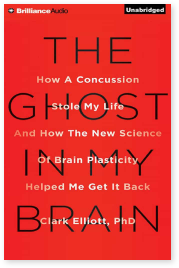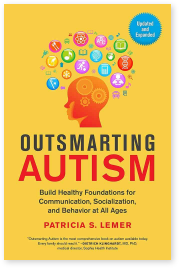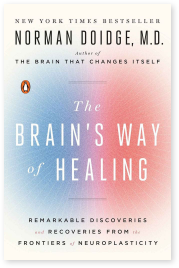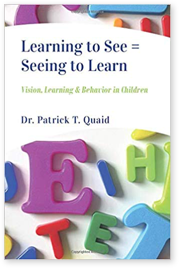Can Glasses Help Someone Hear Better?
Yes. And a simple, quick-and-easy examination developed by the founder of the Mind-Eye Institute, Deborah Zelinsky, O.D. can prove it.
The Mind-Eye Institute is Committed to Transforming Lives
“I love my glasses because they help me hear better.”
Those words – from first-grader Elijah (Eli) – usually elicit a “huh?” from most people, according to his mother, Becky. “Glasses are supposed to help you see better – not hear better.”
But, for Eli, diagnosed as being on the autism spectrum, the “brain” glasses prescribed by the Mind-Eye Institute have done just that – improved his listening capabilities. “They have synchronized his eyesight and hearing, and the results have been profound,” Becky relates.
“Even family members and friends have noticed the changes in Eli since he has been wearing his Mind-Eye glasses,” states Becky, brushing off suggestions that other therapy programs may be primarily responsible. “We have not been attending other therapy programs, yet Eli has been thriving. I credit the glasses with helping him cope better and learn more. I feel every moment he is wearing them they are having positive effects on his brain. Perhaps, over time, these changes will become permanent, and he will not need the glasses.”
Neuromodulation with Lenses: How It Works
The Mind-Eye Institute is recognized worldwide for its assessments of “visual processing.” The term refers to the brain’s almost-instantaneous ability (partially beneath a conscious level of awareness) to take in external sensory signals (from eyesight, hearing, smell, taste and touch), meld them with a person’s internal sensory signals and then synthesize – process — the information, allowing a person to react and respond to his or her environment.
“The retina is composed of brain tissue and is part of the central nervous system," says Dr. Zelinsky, founder of the Mind-Eye Institute.
"By changing the way light passes through the retina, we can affect how the brain reacts to information about the environment and modify a person’s spatial awareness, body posture and selective attention to sound,” says Dr. Zelinsky.
Through careful modulation of retinal signaling using customized, therapeutic “brain” glasses — Mind-Eye Brainwear™– and other optometric techniques, the Mind-Eye Institute is helping those patients who have learning or comprehension challenges, such as ADD/ADHD, autism spectrum disorders (ASD), concussion/traumatic brain injuries (TBI) to develop new visual skills.
Autism and Developmental Deficiencies
For almost thirty years, the Mind-Eye Institute has served patients from national and international locations, assessing peripheral eyesight usage in addition to central (20/20) eyesight. Children with special needs or those on the autistic spectrum, benefit from having Mind-Eye eyeglass prescriptions, which help ensure brain signals are being processed efficiently in a synchronized manner. For instance, eyeglass prescriptions determined by using our patented Z-Bell testing help regulate eye-ear connections. Those Z-Bell prescriptions enhance patients' reading, listening and attention in a majority of cases. The individualized glasses create a stable balance between central and peripheral eyesight, as well as auditory and visual localization ability.
Post-Concussion &
Traumatic Brain Injury Exams
Many people suffer from various post-concussive and brain injury symptoms such as photophobia, ocular fatigue, headaches, dizziness, and sleep problems and mood changes. We understand that interactions between the electrical and biochemical pathways in the brain affect physical, physiological and psychological systems. Patients undergo a thorough examination with advanced technology and testing techniques to measure visual performance and visual processing functions. The goal is to determine whether the visual processing systems are in balance with other sensory systems that require perception of space and time, such as auditory localization ability.
A Different Approach to
Learning Difficulties, ADD/ADHD
At our practice, developmental examinations cover much more than how well a patient can see. For example, a child who is diagnosed with ADD, ADHD, CAPD, or developmental delays, may in fact be experiencing these symptoms as a results at least in part because of visual systems dysfunctions. It is important to realize that eyesight is only one small part of the visual system; there are many other visual inputs often not addressed during routine eye exams. Each of the systems develop in a hierarchy, linking with other systems' development. For instance, motor skills and visual skills combine for good hand-eye coordination, or visual and auditory skills combine for reading.
'Dr. Zelinsky's Work Is Revolutionary'
Norman Doidge, M.D. & Clark Elliott, Ph.D., Dr. Patrick Quaid and Patricia S. Lemer praise her accomplishments:

"Zelinsky fit Elliott with a series of eyeglasses designed to improve the perceptual damage that made his life so difficult... Getting fitted for Zelinsky's eyeglasses is like no eye appointment you've ever had... Now, Elliott says, he is almost entirely symptom-free, able to problem-solve, multi-task and find his way easily — all abilities he lost in the auto accident in 1999. When he put on his Phase VI glasses he felt something that he hadn't felt for years: "I felt normal."
Review: 'The Ghost in My Brain'
The Chicago Tribune

"One brilliant Chicago-area optometrist I know, Deborah Zelinsky OD, FNORA, FCOVD, has developed a unique, patented, easy-to-administer evaluation called the Z-Bell Test. This test measures the efficiency of integration between visual processing and listening....A 2014 study at Vanderbilt University found that children with autism do not synchronize their seeing and hearing...I have watched Dr. Zelinsky administer this test to disbelieving colleagues, who were astounded by its accuracy and results...Over the past two decades, The Z-Bell Test has become internationally recognized by the scientific community.”
Patricia S. Lemer,
Licensed Professional Counselor (LPC)

"I visited Dr. Zelinsky, and she showed me how she can use optical lenses to alter sensory filtering, by directing light to different retinal cells and brain circuits. This can influence activity in the brain and the hypothalamus to better regulate body chemistry, sensory integration, and even some auditory processing. [Dr. Zelinsky] works frequently with patients working with learning and cognitive disorders as well as TBIs."
Norman Doidge, M.D.

"I was delighted to have Dr. Zelinsky personally contribute to the book. Her wealth of knowledge in the area of visual development and visual processing is widely known, not just through her contribution of eye-care to the author of “The Ghost in My Brain”, but also via her Mind-Eye Institute and the lectures and training their provide. Dr. Zelinsky is not just colleague and a friend, but also a valued member of the neuro-optometric community and an invaluable bridge to other allied professions treating brain injuries. Her contribution to the book is deeply appreciated."
Dr. Patrick Quaid, MCOptom, FCOVD, PhD
Interested in Visiting Our Clinic?
Get in contact with one of our New Patient Advocates to book an appointment.
At the Mind-Eye Institute we understand that interactions between the electrical and biochemical pathways in the brain affect physical, physiological and psychological systems. Visual interventions that alter retinal signaling pathways impact both the electrical and biochemical systems.
Our patients undergo thorough examination with advanced technology and testing techniques to measure their reactions and responses to light entering the retina. With this information, experts at the Mind-Eye Institute determine whether a patient’s visual and auditory systems are synchronized. They consider how light might be manipulated to positively impact brain function and body chemistry. The goal is to find optimal ways of mitigating symptoms that are not improved or resolved through standard approaches.
Specifically, our team offers patients prescriptive eyeglasses, contact lenses or other optometric interventions to selectively stimulate light dispersed on the retina. Individualized lenses can:
Getting In Touch With Us
To learn about next steps for registering as a patient or registering a child as a patient, please call the Mind-Eye Institute office at 847.744.9167 or you can fill out our online New Patient Inquiry Form provided here.
The Mind-Eye Institute is a non-participating provider with any insurance company. We don’t bill your insurance directly, but our team will provide you with the necessary documentation to submit to your insurance company for partial reimbursement following your visit.
New Patient Inquiry
Thank you for your interest in scheduling an appointment at the Mind-Eye Institute.
